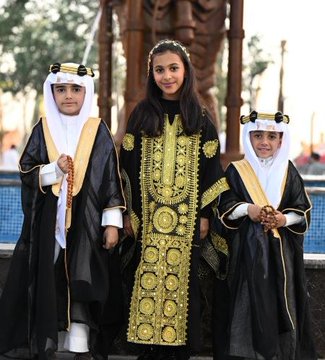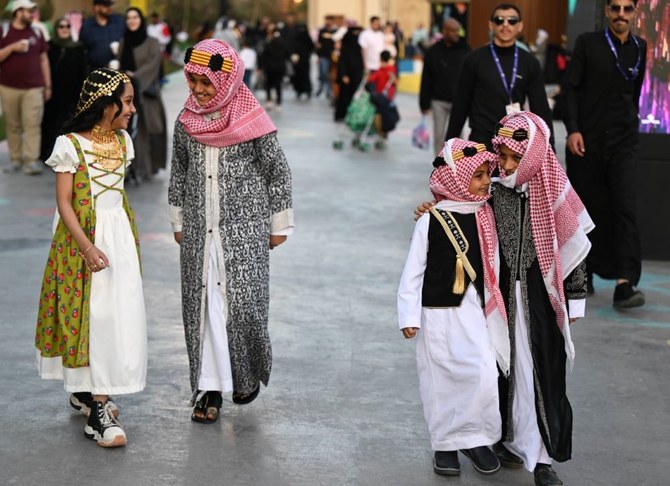
WEB DESK
Saudi Arabia is marking its second Founding Day celebrations with events, activities and a four-day holiday. Founding Day — celebrated on Feb. 22 to commemorate the country’s founding by Imam Mohammed bin Saud — was declared a national holiday last year following a royal decree by King Salman.
Cultural and artistic events are taking place across the Kingdom.

The Kingdom’s capital rang in Founding Day celebrations with parades and live performances in locations across the city.
Families dressed in traditional attire gathered to watch the colorful parades and performances, while streets filled with celebrations.
Al-Kindi plaza in the Diplomatic Quarter hosted a heritage tent featuring a traditional souq, live performances and local dishes for visitors to sample on Wednesday. The event will continue on Thursday.
The Ministry of Culture held a musical theater performance highlighting the history of Saudi Arabia in Princess Noura University’s Red Hall. The show premiered on Wednesday and will continue until Feb. 27.
The Saudi State was founded by Imam Mohammed bin Saud in 1139 AH / 1727 AD. Three centuries ago, the journey of building a great state was launched from its capital, Diriyah.

Imam Mohammed bin Saud was known for his insightful vision, shaped by his understanding of the living conditions in his region, the surrounding areas, and the center of the Arabian Peninsula. He planned to establish a new course for the history of the region by focusing on unity, education, culture, communication, and security. The Imam was also known for his fondness for solitude and contemplation, which reflected his personality and his ability to extrapolate, deliberate, and see his future vision.
Born in 1090 AH / 1679 AD, Imam Mohammed bin Saud grew up in Diriyah, where he demonstrated qualities such as religiosity, love of goodness, courage, and the ability to influence. He gained valuable experience in his youth when he worked with his father to arrange the situation of the region, giving him a comprehensive understanding of its conditions.
Imam Mohammed participated in defending “Diriyah” when Sa’dun bin Mohammed, the leader of Bani Khalid, invaded Al-Ahsa and steadfastly resisted and defeated the aggressor army.
Imam Mohammed bin Saud is an extension of the history of his ancestors, who built and ruled Diriyah, transforming it from the “city-state” to a vast state. He assumed power in exceptional circumstances in the middle of 1139 AH (February 1727 AD) and overcame the challenges of weakness, division, and plague disease in the region. He united Diriyah and contributed to spreading stability.
The most prominent deeds of Imam Mohammed bin Saud are as follows:
The First Saudi State was established, unified, and built during his reign of forty years. During the period of 1139/1158 AH corresponding to 1727/1745 AD, Imam Mohammed bin Saud unified the two parts of Diriyah and brought them under one rule, strengthened the community and organized the economic affairs of the state. He built a new district in Samhan, the Turaif district, where he moved after the Ghasaiba district served as the center of rule for a long time.
Imam Mohammed bin Saud was instrumental in bringing stability to various fields in the state, including political independence and disloyalty to any power. While some of the towns in Najd were loyal to regional leaders, the Imam united the majority of the region and controlled its leaders, making them declare adherence to the state and unity. Also, Imam Mohammed bin Saud sent his brother Prince Mashari to Riyadh to return Daham bin Dawas to the principality after he rebelled against him at the request of Daham Al-Maounah from the First Saudi State and was communicating with other towns to join the Saudi state. The Imam’s ability to communicate with other towns and bring them into the Saudi state was a testament to his diplomatic skills. Another notable achievement was the building of the Diriyah wall, which helped fend off outside threats coming from the Arabian Peninsula’s east.
The beginning of the unification campaigns, assumption of leadership, the unification of the majority of the Najd region, the dissemination of state news in the majority of the Arabian Peninsula, and the ability to secure pilgrimage (Hajj) and trade routes so that Najd became one of the safe areas were among Imam Mohammed bin Saud’s most notable deeds during the period 1159/1179 AH corresponding to 1746/1765 AD.
Imam Mohammed bin Saud died in 1179 AH corresponding to 1765 AD, after forty years of leadership and foundation. His children are Abdulaziz, Abdullah, Saud, Faisal, Ali, Merkhan, Haya, and Terfah.
With input from–SPA
